Peter MALONE
Saturday, 18 September 2021 19:26
Cannonball Run
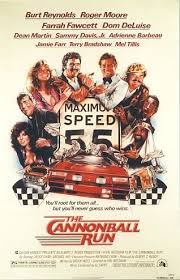
CANNONBALL RUN
US, 1980, 95 minutes, Colour.
Burt Reynolds, Roger Moore, Farrah Fawcett, Dom DeLuise?, Dean Martin, Sammy Davis Jr., Jack Elam, Adrienne Barbeau, Terry Bradshaw, Jackie Chan, Bert Convy, Jamie Farr, Peter Fonda. George Furth, Michael Hui, Bianca Jagger, Molly Picon, Warren Berlinger, John Fiedler.
Directed by Hal Needham.
Cannonball and Cannonball Run were both films about the Transamerican Grand Prix, a coast-to-coast race, which is frowned on by authorities and the police but is available for all drivers - and there are no rules. This theme has been has been taken for many films - e.g the Gumball Rally. Cannonball was directed by Paul Bartel, maker of the imaginative fantasy equivalent of Cannonball, Death Race 2000. While there was an emphasis on cars, action and violence, there was also science fantasy criticism of the present in the form of a critique of future society.
The Cannonball Run treats of the same race but in a much lighter vein. In fact, the film is a variation on the Smokey and the Bandit films which were also directed by Hal Needham, who also made Hooper and Cactus Jack. Needham's star is Burt Reynolds who does his offhand comic hero role without any effort. The film is light-hearted and has quite a few laughs. Its strength is in its cast with Roger Moore portraying a wealthy Jewish businessman (with mother) who thinks he is Roger Moore. Farrah Fawcett adds some glamour as a would-be patient and Jack Elam is the alcoholic doctor. Dom De Luise has his usual comedy style and there is martial arts material from Jackie Chan, comedy from Sammy Davis Jr. and Dean Martin (disguised as priests), T.V. comedian Jamie Farr appears as an Arab sheikh and Bianca Jagger is his sister. John Carpenter's wife, Adrienne Barbeau is a glamorous driver. The emphasis is on action and speed. It is the same formula but more stylish than the Smokey and the Bandit films. It also raises the question about the race, cars, law and order etc.
Published in Movie Reviews
Published in
Movie Reviews
Tagged under
Saturday, 18 September 2021 19:26
Cannonball
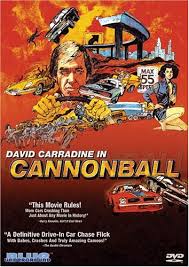
CANNONBALL
US/Hong Kong, 1976, 93 minutes, Colour.
David Carradine, Bill Mc Kinney, Veronica Hamel, Gerrit Graham, Robert Carradine, Belinda Balaski, Judy Canova, Carl Gottlieb, David Arkin, James Keach, Roger Corman, Joe Dante, Jonathan Kaplan, Martin Scorsese, Paul Bartel.
Directed by Paul Bartel.
Cannonball and Cannonball Run were both films about the Transamerican Grand Prix, a coast-to-coast race, which is frowned on by authorities and the police but is available for all drivers - and there are no rules. This theme has been has been taken for many films - e.g the Gumball Rally. Cannonball was directed by Paul Bartel, maker of the imaginative fantasy equivalent of Cannonball, Death Race 2000. While there was an emphasis on cars, action and violence, there was also science fantasy criticism of the present in the form of a critique of future society.
David Carradine was the star. He also stars much more straightforwardly in this film - an ace driver who has been on parole since an accident in which his girlfriend was killed. There is the usual range of fellow drivers: thugs, country singers and their mothers, hippy couples, a black driver driving for a wealthy couple etc. There is the usual emphasis on speed, slick special effects and editing and spectacular action and crashes. The film is no better, no worse than its equals. However it has an interesting cast led by Carradine and his brother Robert. There are guest appearances by Roger Corman and by directors Bartel himself, Jonathan Kaplan, Joe Dante and Martin Scorsese who all worked for Corman. The film raises questions about the role of cars in our society, the obsession with speed and winning, the
attitude towards law and order and law enforcement.
Published in Movie Reviews
Published in
Movie Reviews
Tagged under
Saturday, 18 September 2021 19:26
Cannon, The
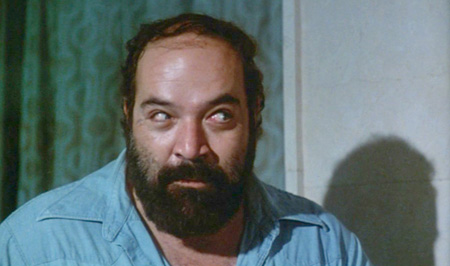
THE CANNON
Italy, 1975, 100 minutes, Colour.
Paul L. Smith, Michael Coby, John Ireland, Woody Strode.
Gianfranco Parolini.
The Cannon is yet another spaghetti western. The different is that the leads called Paul Smith and Michael Coby are imitations of Terence Hill and Bud Spencer. They do not match the originals with their humour even though they look alike, act in similar ways and perform humorous and knockabout tricks.
The material is conventional - the knockabout heroes are set up by the American government to track down gun-smugglers to Mexico. There are gambling sequences, action sequences, humorous riding and fights. Needless to say, the two friends discover the process of the smuggling of the guns and the Americans come in and save the day. The Terence Hill look-alike is the smart one - setting up his slow-witted friend for prison, making him think he has killed a guard, getting him to escape so that he can help him in his mission. There is, as always, colourful scenery and, this time, a song in English for the theme. Neither better nor worse than so many others of its kind - but showing the long popularity of the spaghetti western and the propensity of the Italian film industry to ape American styles and themes.
Published in Movie Reviews
Published in
Movie Reviews
Tagged under
Saturday, 18 September 2021 19:26
Cannibal Apocalypse
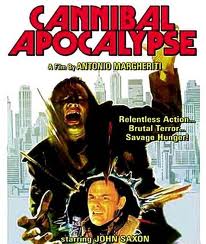
CANNIBAL APOCALYPSE
Italy, 1980, 96 minutes, Colour.
John Saxon, Elizabeth Turner.
Directed by Antonio Margheriti.
Cannibal Apocalypse is yet another of the myriad "spaghetti-horror" films of the late '70s and early '80s. The Italians exploited American genres by taking the plot lines, central characters and themes and inflating them to pulp narrative and ghastly special effects. This film echoes Apocalypse Now - however, the veterans are infected with a cannibalistic rabies because of their imprisonment by the Viet Cong (a la Deerhunter). On return they spread a plague of rabies in which the multiple-murder is exploited. These films often employed English or American stars. The star here is John Saxon. While there is a certain gut-wrenching interest in the basic plot line and its use of living dead/vampire parallels, the special effects and the exploitation of violence and gore would make the film unacceptable to most audiences. Once again, a strange blend of imagination and exploitation.
Published in Movie Reviews
Published in
Movie Reviews
Tagged under
Saturday, 18 September 2021 19:26
Cancel My Reservation
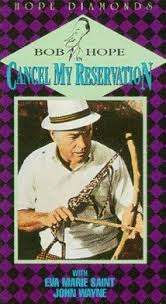
CANCEL MY RESERVATION
US, 1972, 86 minutes, Colour.
Bob Hope, Eva Marie Saint, Ralph Bellamy, Forrest Tucker, Anne Archer, Chief Dan George.
Directed by Paul Bogart.
Cancel My Reservation was one of the last films made by Bob Hope. He is once again teamed with Eva Marie Saint, with whom he had starred in the '50s in That Certain Feeling. This is quite an amusing film with echoes of the thriller, the murder mystery, the criticism of exploiters of the environment. There are also references to the plight of the Indians - a popular theme at the time of this film, as evidenced by Soldier Blue and Little Big Man. The engaging star of Little Big Man, Chief Dan George, appears in this film. While entertaining, with its points made via the comedy and Bob Hope's presence, the film is somewhat strained and not the best Hope comedy.
1. Was this a good comedy? How funny was it? Why was it funny? Its portrayal of human foibles?
2. How successfully did the film use thriller conventions? Old fashioned film thriller conventions?
3. How well did the film blend comedy and thriller? Via the characters, the situations, the irony of the dialogue? The use of colour. locations, music etc.?
4. How typical a Bob Hope vehicle was this film? How important for it was Hope's personality? What type of personality emerged from this film? How attractive, sympathetic? How hard and crusty? The personality as derived from the wisecracks? The references? The tone? How genuinely humorous was Hope?
5. How interesting a character was Bartlett? As a TV personality. his comments on himself. as a weak kind of man, as a humorist, as a man in the modern city needing a rest., etc., his relationship with the people, the quality of his married life, love., his relationship to the sheriff, his earnestness and the importance of clearing his name, his handling of crises? Was he a character or a surface caricature style?
6. How attractive was his wife? As coming from the sane environment? The early years of her marriage. no children, bickering? Her idea of women? Her role on TV and the programme? Her support of her husband, the change into love? The possibilities of the future?
7. How convincing were the villains? Typical cinema villains? Their behaviour and menacing? Villainy of throwing women into the river, etc.?
8. How important for the film was the character of the sheriff and his assistants? Relentlessness, slowness of wit. yet pursuing the truth.
9. How attractive a girl was Crazy. The modern girl contrasting with Mrs. Bartlett? Her linking with the Indians? Providing a dramatic finale?
10. How important was the Indian theme for the film? The wisecracks about white and red men? The importance of land? The points that Bob Hope made? The implications of the plot? The death of Mary? The character of Joe Littlecloud? The importance of Big Bear? The dignity of the Indian in Big Bear and his telling what he knew?
Published in Movie Reviews
Published in
Movie Reviews
Tagged under
Saturday, 18 September 2021 19:26
Canadians, The
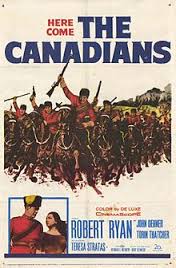
THE CANADIANS
UK/Canada, 1961, 85 minutes, Colour.
Robert Ryan, John Dehner, Torin Thatcher, Burt Metcalfe, Teresa Stratas.
Directed by Burt Kennedy.
The Canadians is a routine western, interesting for its focus on the Canadian heritage in comparison with that of the United States. The treatment of the film is straightforward western style in colour and Cinemascope. The film was written and directed by Burt Kennedy early in his career. He was to make quite a number of memorable westerns from the serious e.g. Welcome to Hard Times to classic comedy westerns especially Support Your Local Sheriff. The film fits in well with his style of the west and his vision of the west and its heroism.
1. Was this a good and enjoyable western? Did it have the impact of a western? The use of conventions?
2. How important was the Canadian emphasis? The prologue, modern Canada, the patriotic song, the spirit of Canada, the modern world and its understanding via the past? How was Canada seen and glorified throughout the film?
3. What were the implications in the film about history and its influence on succeeding generations? The heritage of the pioneers? The good and evil of the past?
4. How important was the emphasis on the Mounties? The explanation of their role in Canada, protections, their special morale and spirit, their heroism? The sense of justice and its administration, the sense of humanity? It was pointed out that this contrasted with the American west. How? The implications of this judgment? The work of a Mountie and then the retiring to build up a farm and pioneer the land? The importance of their police work, the relationship with the Indians?
5. How well did the film portray Indian problems? The complexity of the problems? The Sioux and their suffering in America, the need for migrating, the results of the massacre. Audience sympathy for massacred Indians? The horror of the visualising of this? Yet in contrast, the background of the capture of the girl, her history amongst the Indians, her marriage and child? The atmosphere of avenging and death? The girl and her song, especially in relationship with her child? The death of her child and her wanting to be buried with the Indians? How much insight into the plight of Indians in this film?
6. Audience response to Ryan and his men? The self-made owner of land, his attitude towards his horses, possessiveness? His treatment of his men, the Mounties, the Indians? His lack of conscience in leading the slaughter? His attempts to outwit the Mounties, seek his horses, not regard the danger of the Indians? was it inevitable that he should be killed by them? The working out of justice?
7. The symbolism of the cliff and its explanation in the film: for catching the buffalo, for the horses falling over, for the deaths of the villains?
8. The atmosphere of death in the film: the massacre of the Indians, the inevitability of the villains dying, the girl and the horror of her death?
9. How important were individual incidents in the film: the Indian way of life, the Mounties' relationships amongst themselves, the types of men that Ryan had working for him, the campfire sequences, the attempted rape of the girl, etc.?
10. Were characters important in this film or were they merely symbols of the issues portrayed?
11. What conventions of the western did the film use best? How was the film different from other westerns?
Published in Movie Reviews
Published in
Movie Reviews
Tagged under
Saturday, 18 September 2021 19:26
Camille
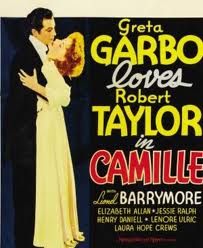
CAMILLE
US, 1936, 108 minutes, Black and white.
Greta Garbo, Robert Taylor, Lionel Barrymore, Henry Daniell.
Directed by George Cukor.
Camille has become something of a movie classic. Directed very tastefully by George Cukor, who was noted for his elegant films of the '30s e.g. Romeo and Juliet, and The Women, and who had a very long and successful career through many decades, winning an Oscar for My Fair Lady.
The film is memorable for Greta Garbo's performance as Margeurite, the Lady of the Camellias, Camille. She invests the elegant courtesan character with a great deal of feeling and dignity. Her romantic scenes with Robert Taylor are memorable and also the death scene. Robert Taylor was at the beginning of his career as a dashing young hero and he matches Greta Garbo well. There is a strong supporting cast, a vivid re-creation of France in the early 19th. century and beautiful black and white photography and musical score. The film is well worth seeing for itself, as an example of M.G.M. film-making in the '30s, and as an example of Greta Garbo's screen presence and artistry.
1. How enjoyable a film is this, considering that this was a classic of the '30s? Why does it have such a famous reputation? The film itself, its style, Greta Garbo, the performances? Does the film deserve its reputation? Why?
2. How interesting is the basic plot? Does it smack too much of the 19th century? Its relevance for modern audiences - its themes of love, shallowness, intensity and betrayal?
3. Why is this a classic romance and love story? Does the film give insight into true love? Into infatuation? Into self-sacrifice and love? Which sequences illustrated this best? Why?
4. How important was the picture of Parisian society for the background of this love story? Did the love story make sense only within this society? What kind of society was it? The prologue mentioned a half-world'. Was this true? How happy was this society? How shallow and superficial? How able to cope with the depths of human experience? How well visually was this kind of society portrayed - in the settings. the houses. theatre, the countryside? The Place of money and snobbery in this society?
5. How attractive a character was Camille? In herself., how superficial and selfish a woman was she? How did she change during the film? Why? The importance of Greta Garbo's performance - what was so special about it? What quality did she bring to the character of Camille? It is suggested she transcended the character. How? Which incidents best illustrated her character? How did she fit into this superficial society world? Her love for money and finery, her flirting, her changing of affections? Her moral sense? When did she begin to change? What effect did Armand have on her? The importance of the sequences in the country? Her happiness? The influence of the Baron on her and the contrast with Armand? Her reliance on Prudence? How well did she take her advice or ignore it? The contrast of Marguerite with Olympe? How did you feel when she was confronted by Armand's father? Did his father have right on his side? Was Marguerite right to sacrifice herself for Armand? The effect that it had on her, the suffering she was willing to undergo, the effect on her health?
6. How attractive a hero was Armand? Was he credible and real? Robert Taylor's personality? What was the difference between his infatuation and his love for Marguerite? Why did he sacrifice his leisure and career to her? What good did he see in her? What effect did she have on him? His idealising of her? Did you sympathise with him when she reacted against him? His shock? His disgust? The impact of his humiliation of her with the money?
7. How happy and how sad was the interaction between Marguerite and Armand? Why? How did the dialogue and the situations portray this? The intensity of Greta Garbo's performance, her way of speaking, her way of posing and movement? What insight into love did this interaction give?
8. The importance of Armand's father in the film? How well handled was the confrontation between Marguerite and the father? Where were your sympathies? Why? Did he have the right to threaten Marguerite as he did? Did you believe his admiration for her?
9. What was your reaction to Prudence? As a symbol of the society in which she lived? Her superficial friendship, her greed for money? The importance of Olympe in the film? An attractive character? What Marguerite might have been like? The importance of Gaston as Armand's friend, and as a support to Marguerite in her illness? His final helping of her with the money etc.? How did these all add to the atmosphere of the film?
10. How villainous was the Baron? Again, as a symbol of this society? His infatuation for Marguerite but no love? His cruelty with possessing her and her affections? His playing the piano with Armand knocking at the door. His final forcing her to look at Armand? The importance of the card game?
11. What was the dramatic impact of the casino sequence? Armand's winning and the humiliation of the Baron? The humiliation of Marguerite? How did this prepare for the final sadness of the ending?
12. How convincing was Marguerite’s death scene? Garbo's portrayal of illness and death? The changing of Armand's heart and his coming? The building up of hopes and yet the impossibility of fulfilment? The quick fading to the end after her death? What was the emotional and dramatic impact of this? Why?
13. How does Camille compare with modern love stories? Why is this film considered such a classic?
Published in Movie Reviews
Published in
Movie Reviews
Tagged under
Saturday, 18 September 2021 19:26
Camera Buff
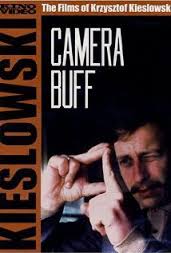
CAMERA BUFF
Poland, 1979, 112 minutes, Colour.
Jerzy Stuhr.
Directed by Krzysztof Kielslowski.
Camera Buff is an interesting and entertaining Polish serious comedy. With its focus on Polish television and the repercussions for government control of the media and the amateur making documentary films which are critical of the State, work, bureaucracy etc. and their winning prizes indicates the kind of criticism possible for Polish directors prior to the clampdown on solidarity. Krzysztof Kieslowski is in the tradition of Zanussi and Wajda. Zanussi appears as himself in the film with an excerpt from his satirical film Camouflage. Television director Andrzej Jurga also appears as himself.
The film is about a small town and a factory, there are glimpses of the ordinary Polish way of life and the factories (with echoes of Wajda's criticism in Man of Marble). The engaging hero, an ordinary polish man, is encouraged to film - with the result that his wife leaves him, his position becomes precarious and he is subject to criticism (perhaps a foreboding of what was about to happen in Poland). The film is subtle in its characterisations and in its situations - does not explicitly preach, but makes its points very forcefully. It is interesting to note that the film won the Grand Prix at the 1979 Moscow Film Festival.
Kieslowski went on to be one of Poland's outstanding directors with The Decalogue, The Double Life of Veronique and the Three Colours Trilogy.
1. An entertaining film: comedy, dram , social observation, political observation, criticism? Local interest? Universal qualities and appeal? Its acclaim e.g. at the Moscow Film Festival?
2. A work of Polish cinema of the '70s: the skill of the directors, their political and social comment. artistry? Message through entertainment? The Polish film industry and its reputation? The connection with television: images, freedom, critique?
3. The camera and its ability to record, Filip and his joy, capacity for observation, creative film-making, comments? The interpretation of the factory, the pressure to make propaganda, his photographing the dwarf? Winning in competitions? The camera observing and criticising - at a remove from reality, yet offering insight? The film itself and its quotation from Camouflage, TV excerpts? The responsibility of film-makers and their instrument? Creativity and the repercussions of fear? The presence of Zanussi and Jurga? Discussions about techniques, editing? Film theory?
4. The presence of the television director and the cinema director - as characters, their observations on film-making and its responsibilities? Lifestyle? The colour photography, the score and the use of classics?
5. The significance of the excerpt from Camouflage and the critique and irony? Zanussi putting forward his views? Jurga and his experience?
6. Filip: an engaging character, audiences identifying with him, pleasantness, naivety? His wife and the bonds between the two? Family life? The disruption, the separation and her walking out? His relationship with his friends? The camera, enthusiasm? His becoming an enthusiast? Home movies, the baby? Work? The foibles of the people in the factory? The competition? The involvement and his becoming more critical in his filming? The authorities, danger, final decisions and warnings? His emotions, honesty? Changes and repercussions for him?
7. The authorities, the atmosphere of efficiency, fear, inefficiency? The factory? Colleagues? The importance of the director and his enthusiasm for film? Support of Filip? The pride of the factory in the film, Zanussi's visit and the fanfare for the celebrity? The television studios? The competition and the variety of people there, films? The Soviet Bloc and the background of totalitarian government?
8. Anna and her interest, skills, support, attraction?
9. The factory director: his appearance, manner. authority. threats. the dismissals? The symbol of the overbearing communist boss?
10. The Polish lifestyle, home, possessions, family? Work and conditions? Television and the ordinary world? Questions of freedom and control?
11. The repercussions on Filip for his experience, for his future?
12. Comparisons with western films? The universality of the Polish industry and its humanity? State-supported cinema with social insight? The role of the individual? Critique via communication?
Published in Movie Reviews
Published in
Movie Reviews
Tagged under
Saturday, 18 September 2021 19:26
Camelot
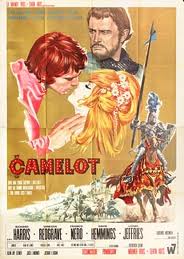
CAMELOT
US, 1967, 191 minutes, Colour.
Richard Harris, Vanessa Redgrave, Franco Nero, David Hemmings, Laurence Naismith, Lionel Jeffries.
Directed by Joshua Logan.
Camelot is another big musical by Lerner and Loewe (My Fair Lady, Brigadoon, Paint Your Wagon, The Little Prince). It was directed by Joshua Logan who was responsible for the film versions of South Pacific, Paint Your Wagon. Logan operates on the big booming principle and consequently his films don't have the same impact as much more stylish directors. Camelot excels in the acting, the costume and decor side of the production. However the serious actors, especially Richard Harris and Vanessa Redgrave, frequently sound ill at ease with the lighter touch of the T.H. White's dialogue from The Once and Only King. The result is that the musical frequently seems ponderous. The music and the songs are a delight. There are many comic touches. The film is also quite spectacular. However, it does not seem to add up to fully satisfying entertainment.
1. What was the overall impact of this film? Its entertainment as a musical, the music, the songs, pageantry, costumes, sets, plot and themes?
2. How adequate was the treatment of the themes in the musical? Was this an adult musical? What expectations of musicals do audiences have? Were they verified in this film?
3. The use of Richard Harris and Vanessa Redgrave instead of musical stars? Did this enhance the film or not? The quality of the singing and the drama?
4. What was the main ideal of Camelot itself? The discussion of the ideal? Arthur's discussion of it at the end and its incorporation into the song at the end? The value of memory and of visions? The Arthurian legend and people's response to this? The bright side of the Arthurian legend? The songs about Camelot, the lusty month of May, the simple folk in Camelot etc.? How well did the film communicate the ideal of Camelot and its peace and prosperity?
5. How sad was the film? The pervading sadness, the flashback of Arthur's memory, the memories of Guinevere, the wondering where things went wrong, the contrast of dreams and reality, Arthur's inability to take a stand and the consequences of his weaknesses, the excusing of evil and yet the evil pervading the kingdom? The theme of evil versus good in Camelot? The sad songs - If Ever I Should Leave You, Lancelot and Guinevere's parting etc.? Arthur's reminiscences?
6. What was the meaning of good and evil in the film? How did each character illustrate both? The complexities of being good and evil? Good and its downfall at the hand of evil?
7. How attractive a character was Arthur? As portrayed by Richard Harris? The mature Arthur remembering, the young Arthur and Merlin, the education by Merlin, his inability to accept himself as king, his fatherhood of Mordred, his shyness with Guinevere, the marriage and their dream, the ambitions for Camelot and peace and the knights of the Round table? The hopes in Lancelot? His not taking a stance on Lancelot and Guinevere, his allowing the disruption, his not taking the advice of Pellinore, the threats by Mordred and his response, his reliance on civil law, the violence in the kingdom and death?
9. How good was Vanessa Redgrave's portrayal of Guinevere? The initial meeting her in the snow? The forced marriage, her liking Arthur, the domesticity of their early life, the farm work, her not knowing herself, the opposition to Lancelot, and then the fascination, why did she deceive Arthur, why did she love Lancelot, the flashbacks during the song If Ever I Should Leave You as illustrating her relationship with Lancelot, the attempted reconciliation with Arthur, the trial and her execution, the value of her repentance?
9. How attractive was Lancelot? His self-opinionated approach, the song C'est Moi, his dreams of the Round Table and the kingdom, his challenging of Arthur, his praise of his goodness, his excess in the tournament, the angelic corrupted by passion, his demeaning himself in lies and deceit? His songs? The relationship to Guinevere and the regret for Arthur? His fighting the knights and causing disruption, his escape, the irony of his career in Camelot? His responsibility for so much of the downfall of the dream?
10. What was the purpose of the character of Mordred? The modern approach, the purple leather? The ambitions, challenging Arthur, rebellion, disrupting the knights etc.? Mordred as evil?
11. The comedy of Pellinore? His song? His role in the kingdom as advising Arthur? Risking opinion yet going back?
12. How magical was Merlin? His role in memory? His function in Camelot? Influence on Arthur? Inspiring the truth by getting Arthur to imagine he was flying or swimming etc.?
13. The role of the ordinary people in the film: in peace, their farms, loyalty, supporting the peace, involved in the wars, their reaction to Guinevere's death - the song about Guinevere and expecting her rescue?
14. The symbol in the young boy at the final battle and his being knighted? The young man going off to tell the legend and inspire a later generation?
15. What were the major themes of the film? Were they well explored and integrated with the musical emphasis?
16. How attractive was the music? How enjoyable the songs? How much did they contribute to the plot? Was this a good musical?
Published in Movie Reviews
Published in
Movie Reviews
Tagged under
Saturday, 18 September 2021 19:26
Cambell's Kingdom

CAMPBELL'S KINGDOM
UK, 1957, 100 minutes, Colour.
Dirk Bogarde, Stanley Baker, Michael Craig, Barbara Murray, James Robertson Justice, Athene Seyler, Sid James.
Directed by Ralph Thomas.
Campbell's Kingdom is the kind of adventure very popular in the '50s. Its Canadian setting is very attractive and presented in colour. The story is by the adventure writer Hammond Innes. Direction is by Ralph Thomas who made a great number of comedies and adventures in the '50s from Doctor in the House and the consequent series to A Tale of Two Cities. Many of these films starred Dirk Bogarde, Stanley Baker, Michael Craig and had James Robertson Justice in support. These are the ingredients of this film which shows the clashes of the rugged men of the Canadian outback. It is conventional enough material but made with British precision and flair.
1. Was this a good adventure story? How well did it use adventure conventions? Which? or did it rely too much on cliche? Where?
2. How authentic was the Canadian background? How interesting was the presentation of frontier life? How strong was the atmosphere of work and the search for oil? The building of the dam?
3. How interesting and accurate a picture of big business interests did the film give? What comment on ruthlessness did the film make? What atmosphere of business ruthlessness and morals did the film give?
4. How convincing a hero was Bruce Campbell? How did the film use the convention of the outsider coming in and challenging the status quo? How convincingly did Bruce Campbell do this? Was it important that he only had six months to live? Was an Englishman? Was the grandson of someone who was not liked?
5. Was Owen Morgan a convincing villain? Was those role overdone? or was he realistic? What motivated him and drove him on? Why was he ruthless and cruel? How ambitious? Disregarding people's lives, even the workers? His hold over the simpleton Max?
6. Was Jean a convincing romantic figure? Was she well integrated into the plot itself? How? were you surprised at her relationship to the man who had defrauded Campbell? Was her desire to make up convincing?
7. Comment on the role of the aunts in the film. Did they add humour? A human touch? Their integration into the plot by one's curiosity and the other's offering money?
8. The character of Boyd Bladen? His relationship to Jean? Conventional? His role in determining whether oil was there or not? His alliance with Campbell against Morgan?
9. How little regard for life was there in this frontier town? How interesting was the scheme that Campbell worked out in order to test out whether the oil was there? The clashes? The murders?
10. The importance of oil in the film? The lengths to which Campbell and his group went to get to the oil field? The dangers they risked on the hoist etc., the plan for blowing up the bridge causing the landslide, deceiving the guards?
11. What was your response to Morgan's sabotaging of the drills? The burning of the fuel? The atmosphere of vendetta in the fields?
12. How interesting was the response of Campbell's group in getting the oil to the top and continuing the search? Were you glad when they discovered oil? Why ?
13. Was the breaking of the dam expected? Was it satisfactorily prepared for? Were Bruce Campbell's interventions too heroic? Even his attempt to save Morgan's life? Was there poetic justice in Morgan's being destroyed by his dam?
14. How convincing was the end with Campbell's discovery that he was not ill but could live? Was this too far-fetched? Unnecessary for the film? Too romantic?
15. Was this a convincing adventure? Is it now dated? or does it still remain enjoyable on an average level?
Published in Movie Reviews
Published in
Movie Reviews
Tagged under